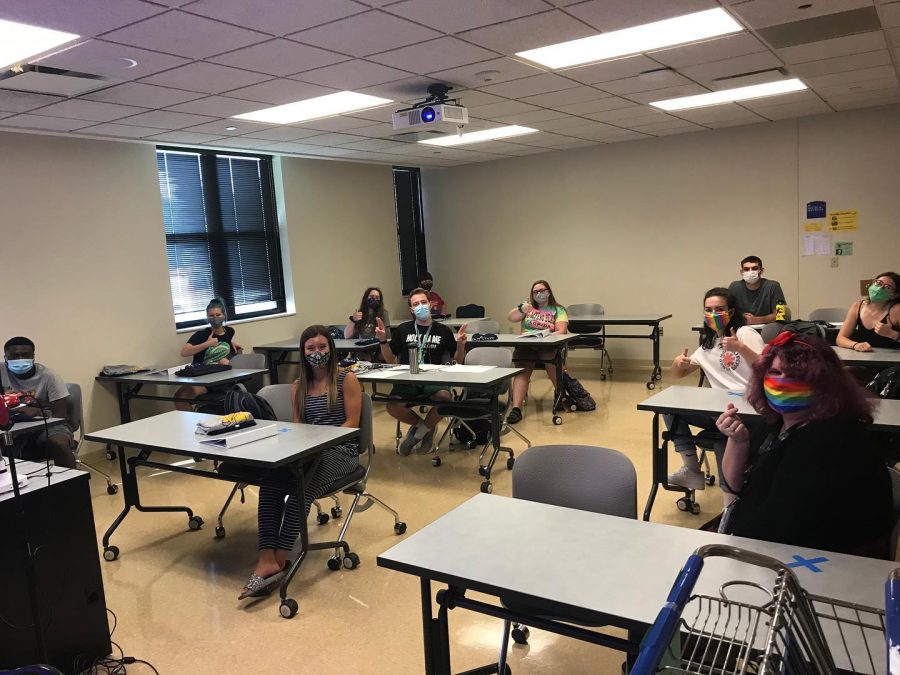Resident assistants handle COVID-19 with virtual events, busy schedules and Flashes Safe Seven
Kylie Snyder lives, works and goes to class in the same room. As a resident assistant, she spends the day studying, reaching out to residents and planning programs that adhere to the Flashes Safe Seven.
COVID-19 has drastically changed how RAs work. In-person group activities have been replaced with Zoom meetings and RAs approach a more hands-off job.
“The really nice thing is that where I work is where I live and where I do my homework,” said Snyder, an RA in Stopher Hall. “That has positives and negatives to it because you don’t really have an escape from your job, but it’s also nice because I can work from my room and everyone that I work with lives on the same floor as me.”
The main challenge of being an RA this year is creating engaging programming that is virtual or socially distanced.
“In the past, food would make the residents come to the event,” said Sean Fitzgerald, a third-year RA in Stopher Hall. “Now, we have to figure out ways to be creative.”
One event Snyder planned was a virtual movie night where residents met on Google Meet to watch “Zootopia” together. Before the movie, she went door-to-door and handed out popcorn and candy. Reverse Trick-or-Treating kept a crowd from congregating to grab snacks and also allowed her to interact with residents individually at their doors.
Snyder also planned a speed-friending event and a painting event that were both virtual. Another RA in the building created a Discord server so everyone in the Stopher-Johnson Honors complex can play games together.
“It has just been something that we’re all adapting to and we’re trying to make the best of it,” Fitzgerald said. “We’re trying to have people feel a part of the community and trying to make things as normal as we can, although I know it’s not anywhere near normal compared to what we’re used to.”
One of the biggest changes for RAs this year is enforcing the Flashes Safe Seven, which includes wearing a mask and staying six feet apart from others.
“Our resident assistants stop and say, ‘Hey, you’re not wearing your mask’ or ‘Hey, it looks like you have too many people in your room’ [and students] are completely compliant,” said Ani Solomon, the Residential Communities assistant director. “They’re sorry, they explain the situation and then they don’t hit our radar again.”
RAs have also changed how they communicate with their residents. RAs used to meet in-person with residents twice a year for a one-on-one conversation to discuss how their semester is going. Now, interactions with residents are virtual or from a safe distance.
“I’ve just been utilizing the lounges, keeping social distance between myself and the residents to make sure we’re safe,” Fitzgerald said. “We’re doing the best we can and that’s the best that we can do. If residents do want to do something virtual, I’ve always told them ‘The option’s yours, just email me.’”
In previous years, Fitzgerald would encourage his residents to walk into his room to talk to him whenever they needed anything. While he still tries to make himself available, he has created more scheduled meeting times and community hours so communication is more structured and students are less likely to knock when he is occupied.
“Normally, I would love to have my door propped open so people could see into my room and see if I’m doing nothing or if I’m just chilling and they can just come and talk,” Fitzgerald said. “Now it’s just like, ‘He could be working.’”
If a student needs him while he’s in class, Fitzgerald gauges the situation to see if the problem is urgent or not. His professors know he is an RA and accept the fact that he may need to leave class at a moment’s notice.
Academics are the top priority of resident assistants as it is for many other students. RAs have classes, family and social lives to maintain. Being an RA is not their full-time job.
“They’re working so hard and they’re genuinely doing the best that they can, but they’re not just staring at their email and waiting for something to come through,” Solomon said. “Overall, our resident assistants do a really good job working with all of the different text messages and GroupMe requests and knocks on their door. And they really do care about their residents.”
An RA is the first person a resident will go to for help. However, Solomon recommends reaching out to professional staff on campus if RAs aren’t responding.
“You can reach out to another RA on a different floor or you can reach out to your RHD (residence hall director) or GA (graduate assistant) in the building,” Snyder said. “There’s plenty of people that can be reached out to. You can really find any RA on campus.”
Overall, Snyder puts her own needs before the needs of others and reminds others in her position to do the same.
“Take a break when you need it and take care of yourself,” Snyder said. “It’s very hard to take care of other people if you don’t take care of yourself.’
Megan Becker covers COVID-19. Contact her at [email protected].
SUPPORT STUDENT MEDIA
Hi, I’m Lauren Sasala, a senior journalism student from Toledo. I’m also the editor in chief of The Kent Stater and KentWired this semester. My staff and I are committed to bringing you the most important news about Kent State and the Kent community. We are full-time students and hard-working journalists. While we get support from the student media fee and earned revenue such as advertising, both of those continue to decline. Your generous gift of any amount will help enhance our student experience as we grow into working professionals. Please go here to donate.



